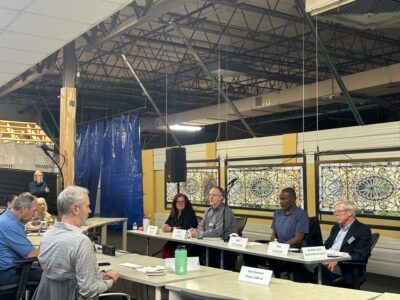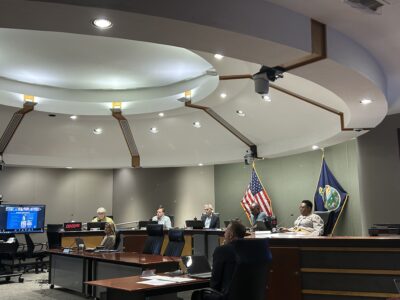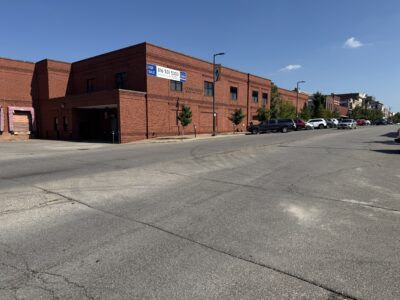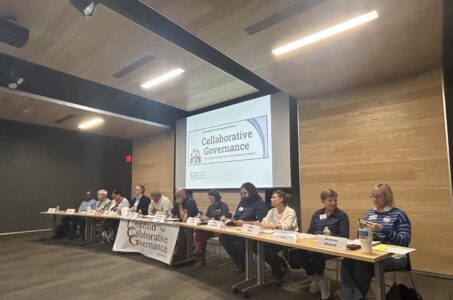Lawrence City Commission candidates field questions from former mayors about housing and homelessness

photo by: Bremen Keasey
Candidates for the Lawrence City Commission answered questions Wednesday night during a candidate forum about addressing housing needs and responding to homelessness.
Candidates for Lawrence City Commission fielded questions on Wednesday about homelessness and development challenges from people who’d made big decisions on those issues before: several former Lawrence mayors.
The four candidates who are vying for two open seats in the Nov. 4 general election — Michael Courtney, Bart Littlejohn, Kristine Polian and Bob Schumm — were all present at the forum, which was held at Peaslee Tech. They answered questions that were created and asked by former mayors, including Courtney Shipley, Boog Highberger and Aron Cromwell.
Many of the questions, which the candidates did not get to see ahead of the forum, were about how they would create more housing in the community. All of them agreed that the city needed more housing stock, but they differed in their proposed solutions.
Schumm said one of the big issues was that the city needed more lots — it was “out of lots, practically speaking,” he said. One way to change that would be to explore ways to annex more land into the city.
While Schumm appreciated that the new Land Development Code let the city add more units and more density, he said the city should also use “common sense” for development and pay attention to its older neighborhoods that could be at risk of being redeveloped. “We need good, livable neighborhoods,” he said.
Polian, too, said that annexation was an option the city should explore, and that the way to bring costs down would be to add more housing. She said that planning for growth is one of the most important things cities can do. She also emphasized that Lawrence needs a more welcoming culture for development, and that she’d heard people say that the city’s “shutters are closed” for development.
The city had focused a lot on infill development, Polian said, which sometimes created a “pressure cooker” in existing neighborhoods. Polian said as development plans come about, the city has “to communicate with the community and figure out what is best,” which could mean going for “slow, methodical, intentional growth.”
Courtney noted that the average price for new homes in Lawrence can sometimes be $100,000 more than what some first-time buyers can afford. He presented an idea of building more modular homes, which he said could reduce costs by 30% to 40%.
Courtney also noted the Land Development Code’s focus on infill development, and he said that with the city facing financial difficulties, annexation to allow for more housing would be important. He said he would look to annex land not only west of Lawrence, but also to the east, in the direction of the new Panasonic battery plant.
Littlejohn, the lone incumbent in the race, said that he believed in walkable neighborhoods and that the new Land Development Code, which he helped pass during his time on the commission, could create a wide variety of dense housing to allow that. He also said the city had been working to address housing needs, including affordable housing, but that the city still needed “to do more,” and he thought the Land Development Code would be a tool to do that.
Littlejohn also noted that since the code just recently passed, the city was in a “curing period” where it was figuring out which parts of the code worked for creating housing stock and which didn’t. He said the next few months would be a chance to “go back in the lab” and make tweaks.
Candidates also shared their opinions on the city’s homeless response and what solutions they’d recommend.
Polian categorized the city’s response as “mildly successful.” She said she heard from people during the campaign who were “entrenched” in providing support for Lawrence’s homeless population, and they told her that what the city was doing wasn’t quite working. She also said the Homeless Solutions Division received funds from three sources with the city: the general fund, a special sales tax approved by voters and the special alcohol fund. If she were on the commission, she said, she would want to see the special alcohol money instead go to the nonprofit DCCCA, which provides a variety of social services including addiction treatment.
Courtney said that he has seen pros and cons in how the city has responded to homelessness. The pros included helping to house 120 individuals in the past year and reducing the point-in-time count of the homeless population, he said. However, one thing he wants to see improved is case management. He said he had heard that case management for individuals is “all over the place,” that there were three different agencies involved in providing it and that there is no one “quarterback” as the main leader. If he were in charge, he said he would work to define that leadership.
Schumm said he thought the city had handled the homeless response wisely in some ways and noted that the city had cleared multiple encampments in recent weeks. He said he had seen “strong results” from the city’s response, but also that the city needed to watch its expenses because the cost of the response had been “way too much money to spend.” He also was happy with the fact the city changed its policies to prioritize helping Douglas County residents and providing resources for people not from the area to bring them to their home counties, saying that Lawrence “can’t take care of everybody in the state.”
Littlejohn said the city saw a 63% decrease in its homeless population based on the point-in-time count from last year, which he said was one of the highest decreases in the nation. He compared Lawrence to Denver, a larger city with more resources that had reduced its homeless count by 45%, but over two to three years. He said that through volunteering, speaking to city staff and hearing from people who were homeless, he had seen that the city had made a lot of progress in providing resources and helping people who were sometimes facing dire situations.
This forum was the first of two that will be hosted at Peaslee Tech. The second forum will take place Monday, Sept. 22, at 6:30 p.m.







